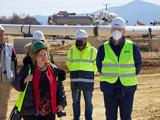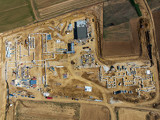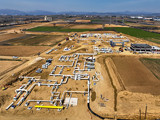All valves for the interconnector with Greece have been delivered; the work on the block valves has been accelerated
An interdepartmental group in Bulgaria is already working on options for reducing the administrative deadlines for the necessary procedures for putting the gas pipeline into operation
The construction of the Greece-Bulgaria interconnector is progressing actively. The activities on the linear part are in the final phase, the construction of the above-ground facilities is well progressing and 50% of the activities for construction of block valves have already been completed. This was established during a two-day inspection by the ICGB management along the entire route of the gas pipeline on Bulgarian and Greek territory.
By mid-March, the linear part of the pipeline is close to completion. All the valves needed for the construction of the block valves have been delivered and their installation is ongoing.
"For 75% of the route the hydro tests have been completed, which is the final phase of the work on the linear part of the project. The EPC contractor estimates the completion of all hydro tests, including on the block valves, to be completed by mid-April at the latest. From now on the gas metering station near Komotini has to be the main focus for the contractor", said the Executive Officers of ICGB Teodora Georgieva and Konstantinos Karayannakos.
"By the end of February, all deliveries for the Bulgarian section of the route have been completed, including the delayed equipment. In view of the events in Ukraine and the growing need for diversification of energy supplies to Bulgaria, we expect the contractor AVAX to fulfill its commitments as soon as possible", said Georgieva and Karayannakos. According to them, an interdepartmental working group with representatives of all relevant state institutions has been set up. The group will work on options for optimizing the administrative deadlines of the procedures prior to the commercial launch of the IGB project. "We are doing everything possible to achieve July 1st as deadline for commissioning. We are grateful for the institutional assistance for reducing the administrative deadlines where possible, but it remains extremely important for the construction contractor to fulfill its commitments not later than the end of May“, the two Executive Officers noted.
During the inspection, it was established that a significant progress on the implementation of the gas metering station near Stara Zagora was made, which is ready at 80%. Due to delays in the deliveries to Greece, the gas metering station near Komotini is at an earlier stage of implementation, completed at 50%. Work is underway on the construction of the dispatching center near Haskovo, where 80% of the construction activities have been completed and the installation of the necessary control and management equipment is forthcoming.
The IGB project is of key importance for increasing security of supply and for ensuring diversification of natural gas sources for Bulgaria and the region of Southeast Europe. At the regional level, IGB will provide access to the gas transmission network for Bulgarian municipalities and regions that didn’t have an option for connectivity. The interconnector with Greece is an entirely new route for the transmission of natural gas to Europe and will give Bulgaria and the region access to supplies from new sources. The project will connect the country with the Southern Gas Corridor and has excellent synergy with other major energy projects such as TAP, TANAP, EastMed and the LNG terminal at Alexandroupolis.
For more information:
Diana Zaykova
Action Global Communications Bulgaria
diana.z@actionprgroup.com
Tel.: +359 2 9803018
+359 885 074 422
+359 885 614 131
IGB Project
Gas Interconnector Greece-Bulgaria is co-financed by the European Union's
European Energy Programme for Recovery programme.
The sole responsibility of this publication lies with the author.
The European Union is not responsible for any use that may be made of the information contained therein.







